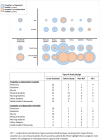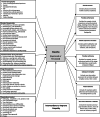A systematic review of research on empathy in health care
- PMID: 35765156
- PMCID: PMC10012244
- DOI: 10.1111/1475-6773.14016
A systematic review of research on empathy in health care
Abstract
Objective: To summarize the predictors and outcomes of empathy by health care personnel, methods used to study their empathy, and the effectiveness of interventions targeting their empathy, in order to advance understanding of the role of empathy in health care and facilitate additional research aimed at increasing positive patient care experiences and outcomes.
Data source: We searched MEDLINE, MEDLINE In-Process, PsycInfo, and Business Source Complete to identify empirical studies of empathy involving health care personnel in English-language publications up until April 20, 2021, covering the first five decades of research on empathy in health care (1971-2021).
Study design: We performed a systematic review in accordance with Preferred Reporting Items for Systematic Reviews and Meta-Analysis (PRISMA) guidelines.
Data collection/extraction methods: Title and abstract screening for study eligibility was followed by full-text screening of relevant citations to extract study information (e.g., study design, sample size, empathy measure used, empathy assessor, intervention type if applicable, other variables evaluated, results, and significance). We classified study predictors and outcomes into categories, calculated descriptive statistics, and produced tables to summarize findings.
Principal findings: Of the 2270 articles screened, 455 reporting on 470 analyses satisfied the inclusion criteria. We found that most studies have been survey-based, cross-sectional examinations; greater empathy is associated with better clinical outcomes and patient care experiences; and empathy predictors are many and fall into five categories (provider demographics, provider characteristics, provider behavior during interactions, target characteristics, and organizational context). Of the 128 intervention studies, 103 (80%) found a positive and significant effect. With four exceptions, interventions were educational programs focused on individual clinicians or trainees. No organizational-level interventions (e.g., empathy-specific processes or roles) were identified.
Conclusions: Empirical research provides evidence of the importance of empathy to health care outcomes and identifies multiple changeable predictors of empathy. Training can improve individuals' empathy; organizational-level interventions for systematic improvement are lacking.
Keywords: empathy; health personnel; impact; intervention; patient experience; systematic review.
© 2022 Health Research and Educational Trust.
Figures



References
-
- Browne K, Roseman D, Shaller D, Edgman‐Levitan S. Measuring patient experience as a strategy for improving primary care. Health Aff. 2010;29(5):921‐925. - PubMed
-
- Institute of Medicine . Crossing the Quality Chasm: A New System for the 21st Century. National Academy Press; 2001. - PubMed
-
- Balik B, Conway J, Zipperer L, Watson J. Achieving an exceptional patient and family experience of inpatient hospital care. IHI Innovation Series White Paper. Cambridge, Massachusetts: Institute for Healthcare Improvement; 2011. Available on www.IHI.org
-
- Chatterjee P, Tsai TC, Jha AK. Delivering value by focusing on patient experience. Am J Manag Care. 2015;21(10):735‐737. - PubMed
Publication types
MeSH terms
Grants and funding
LinkOut - more resources
Full Text Sources
Miscellaneous

